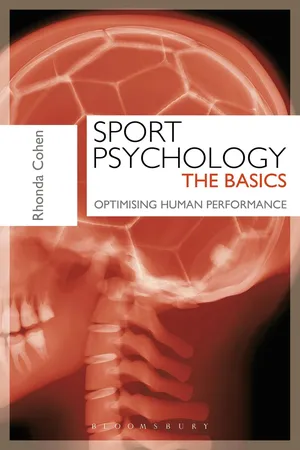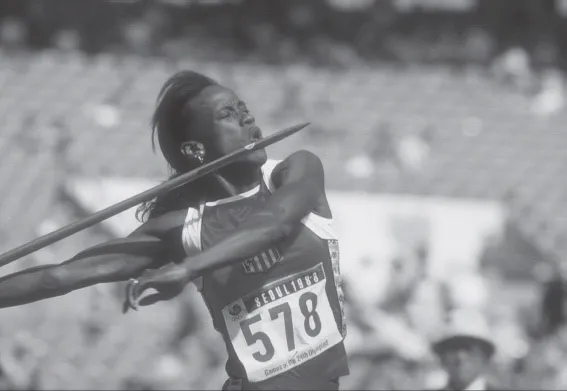![]()
PART 1
ASSESSING SKILLS
Heptathlete Jackie Joyner–Kersee
![]()
1 | SPORT PSYCHOLOGY AND ASSESSING SKILLS |
‘The battles that count aren’t the ones for gold medals. The struggles within yourself – the invisible battles inside all of us – that’s where it’s at.’
Jesse Owens (Multiple gold medallist at the 1936 Olympics)
Objectives
1.What sport psychology can do for you
2.The importance of self-belief and the mind–body relationship
3.The use of sport psychology should be adapted to meet individual needs
Sport psychology is for everyone who loves a challenge and wants to fulfil their potential in sport or fitness. The main thrust of sport psychology is to help you perform better and more consistently by learning or improving mental strategies. It relies on various techniques, which can impact on everything from enhancing performance to recovering from injury.
There are a variety of reasons why you should use sport psychology. Firstly, it can help you to identify your strengths and weaknesses while providing you with appropriate techniques for a positive mindset. This identification can enable you to get the best out of yourself and in addition prevent injury. You can better integrate physical practice with mental preparation and handle competitive pressure. Sport psychology can help you to build life-skills at any age and develop a strong healthy mind to use both inside and outside of sport.
WHAT DO YOU NEED IN ORDER TO BE SUCCESSFUL IN USING SPORT PSYCHOLOGY?
In order to be successful in using sport psychology, you need to have, or be willing to develop, a sense of self-belief. You need to understand that you can manage your own geneptic predisposition, that there is a connection between your mind and your body, and that you can learn from feedback. Bear in mind that there may be differences depending on your particular sport.
It is important to have self-belief. You need to believe that it is possible to change and improve your performance. If you see yourself as a robot or a pre-programmed computer, then there is little chance of ever doing anything different; whereas, if you believe that life is full of new opportunities and experiences just waiting to happen, then you are open to trying something new and thinking in a novel way. Experience does have an effect on how you consider these options. You are what you think. You can see yourself in various ways. You have chosen to see yourself in a particular way so your thoughts and beliefs will determine your experience of life. Your thoughts, in essence, are self-perpetuating or self-fulfilling. By being aware, trying new ways, adapting a new template for life that suits you will give you a different outcome.
An understanding of your genetic programme is part of the process of developing your performance. You are a product of the genes you were born with and that can’t be changed. However, you can learn strategies to help you manage your innate personality. For example, you may be naturally more anxious than other competitors. It is essential to understand that sport psychology works by providing you with coping mechanisms; however, you need to recognize that your own genetic predispositions impact on your current thoughts and behaviour.
You are always the expert in how you see the world, so it is important you understand how you interpret information and how you feel about those insights. The skill of self-reflection and awareness is invaluable in gaining insights into what challenges you face and how you respond.
The mind–body relationship is established and accepted as an important element in human behaviour. For example, lifting heavy weights is harder when you perceive the weights are heavy in your mind, just as running the last leg of a race is even more exhausting when you believe that your energy fuel gauge is on zero. This is a collaboration of mind and body; two separate entities united. This can be illustrated by the following activity. Place your arm out straight and clear your mind. With your other hand (or borrow someone else’s) push it down. This should be relatively easy. Now, try changing your mindset. Prepare yourself mentally by concentrating and visualizing your arm as a concrete rod. Your muscles will tense, and the stronger the thought, the more taut your arm will become. Push your arm down with your other hand; whether it is easier or more difficult to move is based on the mind–body relationship. Your body relies on you as an expert to facilitate the integration of your mind with your body. Take two players with the same physical ability competing side by side and alter the mindset of one of them. Why will one of them win? Physical training alone is not enough to excel in sport.
Understanding sport psychology also relies on the fact that different sports have different tapestries. This means that the psychological requirements in football are not necessarily the same as in golf or BASE jumping. Therefore, understanding the needs of your sport is important. This is where a good coach or trainer can provide key insights.
Learning is a key to change in sport psychology. Neuro-Linguistic Programming (NLP) teaches you that ‘failure is one type of feedback’. You learn from everything you do, whether the outcome is successful or not. You should not be afraid to take a risk and try out new strategies to improve. Whether you are an elite or talented athlete in the recovery stage of an injury, a recreational player who wishes to improve, a coach, a student, a (trainee) psychologist or a parent working with any one of these groups, sport psychology empowers you with the idea to believe that you can learn to achieve more.
It is one thing to think about or want to change; it is another thing to go ahead and actually do it. When you commit to your sport, you commit to the psychology of your sport.
ARE THERE DIFFERENT WAYS TO USE SPORT PSYCHOLOGY?
Sport psychology should be adapted to suit different learning styles and the setting in which it is practised. For instance, sport psychology training often focuses on the idea that you can create visions or pictures in your mind that affect how you see and feel. This is something we do well in childhood and many of us can still draw the pictures in our minds of special books that we read, TV programmes that we watched or games that we played as kids. Visual interventions can work well with the young and those who are visual learners. If you struggle with this concept and learning visually doesn’t come naturally, then I recommend that you first try to develop the skill by practising the reflective exercises at the end of this chapter (see here). If, however, visualization doesn’t fit in with your learning style, there are other techniques to use. Perhaps you prefer to learn through words. If so, then work harder on exercises that require you to track your thoughts and perceptions. Positive statements make you believe that you can do anything and brighten your outlook, though you need to set objectives along the way. If you are more of an auditory learner then listen to recordings or apps on your phone. Guide yourself through, hearing how to improve your focus.
Sport psychology can work in different settings. It can be used inside or outside of competition and in- or off-season. A good routine follows a loop or circle: pre-season, the week before the game, the day before, the day of, during the game, after the game (feedback) and back again. Sessions between a player and a sport psychologist can be conducted online when athletes are travelling to different competitions or venues. Electronic messaging enables an athlete, parent or coach to keep in contact with their sport psychologist from anywhere in the world and often the sender gets an immediate answer to a problem. You can arrange one-to-one meetings where strengths and weaknesses can be identified and worked on. It can even be used on the field or pitch.
In conclusion, sport psychology depends on believing that you can change and learn from the experiences and exercises you try out. Like a new food, a new way of thinking may be an acquired taste. Sport psychology tools are dynamic, rather than static. Learning to be the master of your own destiny therefore requires regular practice. The more committed you are, the more chance you have of improving your performance and achieving your goals.
A sport psychology strategy can help you develop your future success. Read the chapters in this book in any order, or pick out any question from the contents that you would like to know more about. This book is designed to help change your mindset, improve what may not be working for you and enhance what is already working. So dive in!
Questions to consider
1.How could sport psychology be important to your development?
2.Are there any mental skills in your sport in particular that ...

